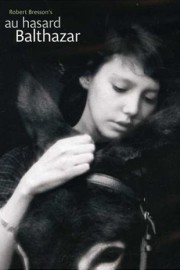Au Hasard Balthazar
This film was my first introduction to the films of Robert Bresson, and immediately immersed me in a filmmaker’s style that’s simple yet speaks to a viewer in a profound manner. And his main character doesn’t even say a word.
The character in question is Balthazar, a donkey who is bought at an early age by a farming family in France, mainly as a way of the father pleasing his daughter, Marie (Anne Wiazemsky). Not long after, Marie and her childhood friend Jacques (Walter Green) baptize the animal– fitting given the spiritual nature the animal will take on as the film goes on. Marie and Jacques are very infatuated with each other, and plan to marry one day, but Jacques’s father moves the family, leaving Marie’s father, a schoolteacher, to tend to the farm. They do well, but eventually, the farm fails because Marie’s father is a prideful man, and refuses to produce records that would show that, despite rumors, he is not stealing from his boss. The family loses everything, and are forced to give up Balthazar, who is taken in by the family of a town bully named Gerard (François Lafarge). Gerard is a terrible person, and abusive towards Balthazar, but Marie is interested in him, although Gerard treats her almost as poorly as he does Balthazar. Eventually, Balthazar is sold to the town drunk, and begins a new phase of his life.
Bresson doesn’t humanize Balthazar as a lesser filmmaker, and filmmakers of cartoon films, would have, by giving him a voice besides his natural burr– he simply allows the donkey to exist as what it is. But the genius of the film is that through it’s experiences with the different citizens in the small village, Balthazar is humanized in our minds. When he’s mistreated, we feel pity for the animal. When he’s shown affection, we feel compassion. When we sense danger, we worry. When we sense he’s at peace, we feel an overwhelming sense of satisfaction, in particular in the memorable final passages of the film, when Balthazar is allowed to simply exist, with no demands forced upon him. Bresson uses Balthazar to show life in a small town, filled with many different people– some good, some bad, some in between –whose best, and worst, is brought out by Balthazar. A donkey is not a dog or cat, both of which have big personalities that make them easy pets (and easy centers for a film), but simply a beast of burden. Bresson gives him reaction shots to events in the film, but doesn’t try to give him personality. He is merely a witness to the lives of these people who walk in and out of his life. The most significant thing about Balthazar’s life is when he walks away from the drunk, Arnold (Jean-Claude Guilbert), and wanders into a local circus, where he gains fame as “The Mathematical Donkey.” He is soon back in the care of Arnold, and later, Marie’s family. His life has come full circle, and he eventually find his way back to the pasture where he was born, surrounded by animals like him.
Religious terminology and significance has been used in talking about “Au Hasard Balthazar” by critics such as Roger Ebert, who called it Bresson’s “most heartbreaking prayer,” and in the two times I’ve seen the film, it’s impossible to argue with such assessments. This is one of the purest morality tales film has ever given us, presenting the good, and evil, in human hearts with straightforward terms, and in a way that doesn’t offer judgement. Yes, we, the viewer, can pass judgement on the characters of the film, and subscribe meaning to a moment like when Balthazar first leaves Arnold– the drunk has just made a promise to Jesus never to drink again, and immediately goes back on that promise. Does Balthazar sense this? Perhaps, but it’s just as likely that Bresson is manipulating us, through his film, and the way he cuts the scene, to get us to feel this way, because after all, Balthazar is just a donkey, and donkeys don’t necessarily burden themselves with the emotional turmoils of man. If they are in a person’s life, it is likely for labor rather than companionship. That Bresson presents an intellectual and emotional quandry like this in the viewer, asking us to consider the inner thoughts of a donkey, and does it in a way we are unlikely to forget, is a great gift. Like it’s main character, “Au Hasard Balthazar” has no meaning beyond that which we prescribe to it. It’s simple. It’s real. And it stands as a mirror for us to look at, and maybe take some lessons from as we move forward in life.










